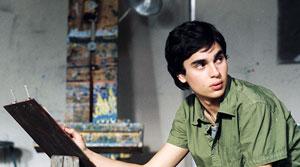
Art School Confidential (Terry Zwigoff, 2006)
Jerome Platz (Max Minghella) wants to become the best artist of the 21st century. Right after high school, he enrolls at the Strathmore Art School hoping to be the one out of the one hundred students who'll make it big in the art scene. He rooms with a film student and a closet gay fashion student, falls in love with the beautiful nude model Audrey (Sophia Myles), and finds a rival in city boy-turned-art boy wonder Jonah (Matt Keeslar). While the angst and vile competition inside art school is happening, a murderer roams the streets and strangles random victims at whim.
It's a brilliant idea: setting a murder mystery inside the microcosm of nerds and freaks that is the art school. Zwigoff, who is no stranger in telling the stories of outsiders trying to find a niche in this human world --- Robert Crumb in Crumb (1994), Enid in Ghost World (2001), the conniving conmen in Bad Santa (2003) --- creates a world wherein everything is weird and everyone's a freak, and in such a way, in order for one to stand out, one has to be utterly normal. The art school in Art School Confidential is teaming with lifeless hacks (both students and professors) that most of the humor Zwigoff and Daniel Clowes cook up are sourced from the fact that aesthetics is an informal creature. Yet, in the art school, aesthetics is learned and in a way, for a piece of trash to be considered art, it has to be criticized not with objective notions of beauty but with subjective and somewhat warped sense of equalizing originality with outsider viewpoints. When the art professor (John Malcovich) praises an artwork which is mostly a badly drawn automobile plastered in drab yellow, one can't help but chuckle at the irrationality of the praise.
It is that unpredictable nature of human aesthetics that sum up the conflict in Art School Confidential. The talented Jerome enters the art school confident with his talents and is literally humbled by the idea that his realistic drawings are shit compared to pentel pen scribbles. Ultimately, once permanent notions of what is art is broken and Jerome is left in a black hole of perpetual discernment as to what direction he should take. To add misery to the defeat and the untimely humbling, his love for Audrey is also taken away with the instantaneous celebrity status that attaches to being the "new voice" of art. Instead of earning a learning experience, Jerome's stint at the art school has proven to be a damning experience wherein he would naturally take in the fact that art is not art, but commercialism boxed up in pretty lines and attractive colors. The ending wherein Jerome achieves his ambition with the added attraction that the art comes from what it seems to be a demented individual indicates the idea that his art is only art world-worthy art if he is a public figure of some notoriety, the same way as Van Gogh's works are art because it comes from a guy who cut off his ears, or that Picasso's works are art since it comes from a chauvinistic bully.
It's an excellent film, I think. Zwigoff and Clowes again created a film that is both funny and insightful at the same time. There are some ugly spots in the film though. I thought Minghella was a miscast. He looks like a hybrid of Enid's misanthropic outsider and an up and coming matinee idol. He can't seem to inhabit his character with self-assured ease and instead, leans on Clowes' dialogue to dictate what kind of human being he is. There are some jokes that seem to be a staple in the genre that the film could've done without --- the film is already funny as it is, and the jokes are just extra calories to an already fattening confection. But it's still a pretty interesting pic, notwithstanding the abovementioned comments and the other tics that bothered me throughout the film. It's quite amazing how Zwigoff and Clowes can come up with so many variations of these tales of misanthropic, anti-social outcasts and still remain amazingly original and fresh.
0 comments:
Post a Comment